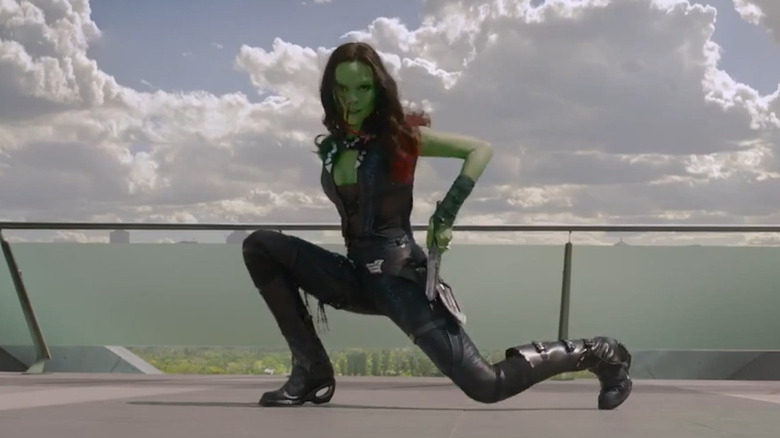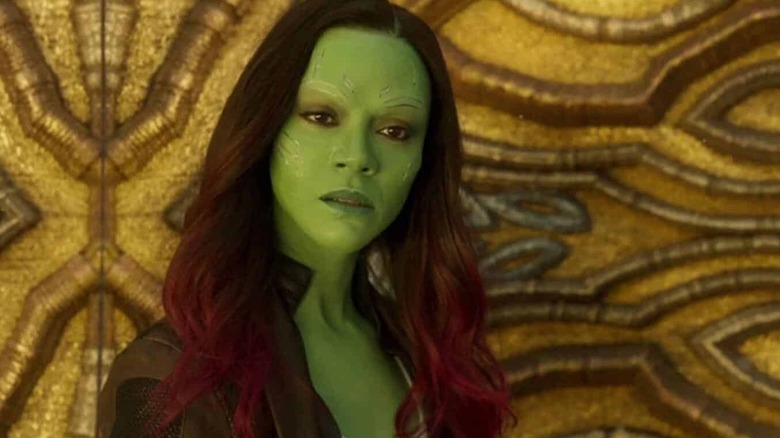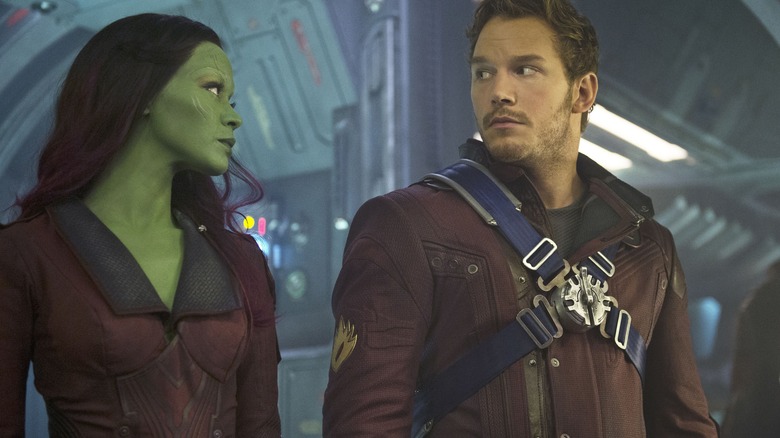James Gunn Considered Not Including Gamora In Guardians Of The Galaxy 3
Oh, the drama of living in a superhero universe. Just when it seems you find the woman of your dreams, she is tossed off a cliff by her murderous, tyrannical space alien father in exchange for a magical rock. Then, after a five-year period when half of the universe is dead, you find a new job restoring their lives. In so doing, however, your old beloved is rescued from an alternate timeline. Only now, she has no memory of you or your time together. What else is there to do but turn to drink and listen to nostalgic songs on your still-working Zune?
This is what happened to Peter Quill (Chris Pratt) over the course of several films in the Marvel Cinematic Universe. He and the dangerous assassin Gamora (Zoe Saldaña) began to form an uneasy romance in 2014's "Guardians of the Galaxy," and she was brutally murdered by her own father in 2018's "Avengers: Infinity War." By "Guardians of the Galaxy, Vol. 3," Gamora had been plucked out of the past and inserted into the present, leaving her and Peter in a strange position. He was in love with an alternate version of Gamora, and the woman in front of him — technically the same person, but kind of not — did not share the sentiment. A large part of "Vol. 3" deals with Peter's romantic struggles stemming from this extraordinary situation.
Filmmaker James Gunn, who wrote and directed the Guardians-only feature films, found himself going back and forth on Gamora when he was writing "Vol. 3." According to a recent interview with the New York Times, Gunn pointed out that Peter could have been destitute without Gamora whether she was in the film or not.
'I toyed with it a lot'
When asked if he had ever considered removing Gamora from "Guardians of the Galaxy, Vol. 3" altogether, Gunn said:
"That was a possibility, yes. [Peter] would be dealing with her loss, but she wouldn't come back and confront him in this different way. I toyed with it a lot as I was writing the script."
The inclusion of Gamora not only allowed for the return of an actress that audiences liked – Saldaña has appeared in several of the highest-grossing films of all time — but ultimately added to the drama. Peter was without Gamora, but also with her at the same time. Gamora, meanwhile, had to deal with the affections and sadness of a man she had never met, testing the limits of her empathy.
Gunn points out that Peter, although in his 40s, is severely arrested in his development. He was abducted from Earth at age eight, and, years later, still adheres strongly to his Earthbound childhood, carrying around a lunchbox and listening to the same audio cassette he had on him at the time. Peter, then, unduly projected expectations onto the new Gamora based on what he needed, not on who she was. Gunn defined it thus:
"It's something we do a lot in relationships anyway: We expect someone who reminds us of somebody from the past to be that somebody from the past. Especially with women, Peter Quill defines people around him to suit his own needs as opposed to really looking and seeing who they actually are as human beings. And Gamora is just not the same Gamora. She's a different person."
Romance in the MCU
While Gunn may have made the best decision in terms of character and drama, the walked-back love story between Gamora and Peter Quill does point to an issue the Marvel Cinematic Universe has seemingly always had with romance. Superheroes, it seems, are incapable of having actual long-term relationships, or even short-term ones for that matter (She-Hulk and Daredevil notwithstanding). When a character falls in love in the MCU, it typically dooms one of the parties involved. One party might betray the other, or perhaps one character will be put into peril merely to incite action by the other. Families are ripped apart on the regular in the MCU and marriages are practically nonexistent.
The "Guardians of the Galaxy" movies managed to have a romance, a tragic loss, a fridging, and post-romance banter, all with the same two characters. The only thing it didn't have was a wedding or a commitment. The characters all across the MCU are, to ascribe them all a common quality, soldiers. The Avengers are a freelance military force who are more committed to weaponry and battlefield camaraderie than they are to actual, practical heroism. They are all willing to fight to protect the ones they love, but none of them are brave enough to stay with the ones they love.
But Gunn, an incredibly sentimental filmmaker, was likely sensitive to this. Rather than merely letting Peter Quill stew in his own misery, Gunn allowed Quill and Gamora to reunite, sort of. And that was, for audiences, the more satisfying choice. Merely leaving Gamora out would have felt unfair. For "Vol. 3," perhaps Gunn could have cut Adam Warlock and devoted more time to romantic conversation.


